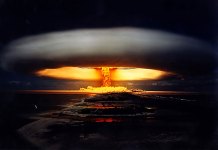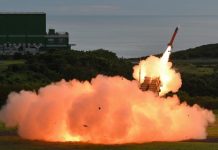After the deadly Christchurch Mosque Attacks, New Zealand imposed an immediate ban on assault weapons taking swift action again the deadly massacre which prompted top US politicians to seek similar curbs in the country.
India To Assist Sri Lanka In Developing Kankesanthurai Harbour Into Commercial Port
The killings by an Australian white supremacist have caused national soul-searching over New Zealand’s lax gun laws. But the tough crackdown promises to have political repercussions beyond the country’s shores, including in the United States where gun control is one of the most divisive political issues.
Proponents of gun control in the United States and around the world praised the move and denounced the US pro-gun lobby on social media, while American gun supporters defended their constitutional right to bear arms.
“This is what real action to stop gun violence looks like,” Democratic US Senator and presidential hopeful Bernie Sanders tweeted.
“We must follow New Zealand’s lead, take on the NRA (National Rifle Association) and ban the sale and distribution of assault weapons in the United States.”
High-profile Democratic Congressperson Alexandria Ocasio-Cortez contrasted the swift ban with US failure to enact even modest controls following recurring deadly shootings such as the massacre at Sandy Hook Elementary School in Connecticut in 2012, in which 20 children and six school staff died.
“Sandy Hook happened 6 years ago and we can’t even get the Senate to hold a vote on universal background checks,” Ocasio-Cortez tweeted.
“Christchurch happened, and within days New Zealand acted to get weapons of war out of the consumer market. This is what leadership looks like.” No reaction was immediately seen on the Twitter feed of US President Donald Trump.
The killer Brenton Tarrant live-streamed the carnage in real-time, and the horrific scenes have heightened global concern over access to guns and the use of social media by extremists.
New Zealand’s steps include interim measures to prevent any rush to purchase guns before legislation is enacted and effectively outlaw all such weapons already in private possession.
“The effect of this will mean that no one will be able to buy these weapons without a permit to procure from the police. I can assure people that there is no point in applying for such a permit,” Ardern said.
For the guns already out there, Ardern announced a buyback scheme that will cost between Nz$100 million and $200 million (between US$69 million and $139 million), depending on the number of weapons received and valuations.
“The vast majority of New Zealanders will support this change. I feel incredibly confident of that,” she said.
Simon Bridges, leader of the opposition National Party, embraced the ban, pledging to “work constructively” with the government.
“The terrorist attack in Christchurch last week has changed us as a nation,” Bridges said in a statement. “We agree that the public doesn’t need access to military-style semi-automatic weapons.”
Initial public reaction was positive in the still-shocked country, where hundreds of people turned out for a second day for sombre funerals for the Christchurch dead.
United States Intervention Began After Pakistan Attacked Indian Jets: Official
“It’s a good thing. Why would we need to have guns like this in our houses?” Kawthar Abulaban, 54, who survived the shooting at Al Noor mosque, one of two targeted by Tarrant, told AFP.
“The semi-automatics, why would you keep that inside your house? It’s not right.”
More News at EurAsian Times
- Indian Military Base in Sabang can Strangle China at the Strait of Malacca
- Why is Japan Unhappy with Bullet Train Project in India?
- Is Saudi-UAE Alliance Working to Weaken the Gulf Cooperation Council?
- India-Japan Defence Partnership Aggressively Countering China
- Oman-UAE Relations Deteriorate; Muscat Warns Against Testing Patience




